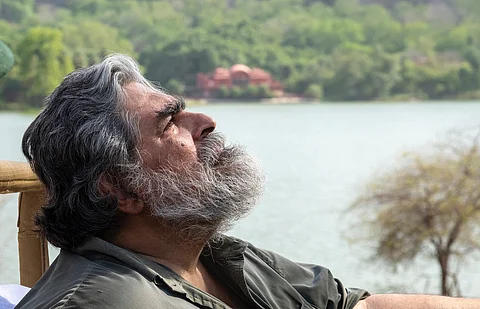
- Destinations
- Experiences
- Stay
- What's new
- Celebrating People
- Responsible Tourism
- CampaignsCampaigns
- SubscribeSubscribe
- Buy NowBuy Now

Renowned tiger conservationist and author Valmik Thapar died at his home in Delhi on Saturday morning (May 31). He was 73 and was diagnosed with cancer last year.
A towering figure in India’s wildlife conservation movement since the mid-1970s, Thapar was known for his decades-long work in protecting tigers, serving on more than 150 central and state government panels in a bid to protect the iconic species.
Outlook Traveller takes a look at Thapar’s legacy and successes.
Valmik Thapar was born in 1952 in Mumbai to Romesh and Raj Thapar, journalists and co-founders of the political journal “Seminar.” His aunt is Romila Thapar, one of India’s most celebrated historians.
Thapar’s love affair with the tiger began in Ranthambhore in 1976, when as a young man he was taken under the wings of Fateh Singh Rathore, then the director of the Ranthambhore Tiger Reserve in Rajasthan. Despite the younger man being outspoken and often contrarian, Rathore and Thapar's partnership inspired India’s conservation efforts and policies for over four decades. The duo spent years tracking the fortunes of the park’s tigers—recording their behaviour, documenting footage, and creating and implementing the management strategies that have made Ranthambhore the premier wildlife destination that it is today.
Thapar served in multiple apex bodies of the Indian government, including the National Board for Wildlife. He was also a member of the 2005 Tiger Task Force, which was set up to prescribe reforms in the aftermath of the disappearance of tigers from Rajasthan’s Sariska Tiger Reserve. He was a staunch critic of the government, famously observing that “bureaucracy killed more tigers than bullets ever did,” criticising the forest department's unwillingness to curb poaching through armed patrols, and their refusal to open forests to scholarly scientific enquiry.
In his books, most notably “The Last Tiger: Struggling for Survival” (2012), Thapar assessed the perceived failure of Project Tiger, drawing attention to its mismanagement by a forest bureaucracy that was largely not scientifically trained.
An excellent orator and a vocal advocate of responsible tourism, Thapar challenged the belief that all forms of tourism harm wildlife. He supported innovative approaches that fostered collaboration between communities, scientists, forest staff, bureaucrats and the media to create sustainable conservation models. He also partnered with the non-profit Dastkar to create livelihoods for displaced villagers.
While Thapar’s conservation work was primarily focused on Rajasthan, he was instrumental in revitalising many other national parks, such as Maharashtra’s Tadoba-Andhari Tiger Reserve.
His writing output was prolific, too, publishing 32 books—including four on Africa—and fronting 16 international documentary films, including the seminal BBC series “Land of the Tiger” (1997).
In 2017, Thapar received the “Lifetime Service Award” from the Sanctuary Nature Foundation for his relentless efforts in preserving India’s tiger population. He summed up his life’s work in his 2012 book “Tigers/My Life: Ranthambhore and Beyond,” writing, “My life has been a long conversation with the wild.”
Until his last days, Thapar continued to be involved in conservation work, notably through TigerWatch, a non-profit established by Fateh Singh Rathore in Sawai Madhopur. Recognising the need to engage and uplift local communities in protecting the tiger, Thapar founded the Ranthambhore Foundation, whose work he guided until 2000.
Congress leader and former environment minister Jairam Ramesh took to X to mourn Thapar's death, calling it “a great loss.”
Valmik Thapar is survived by his wife, Sanjana Kapoor, and son, Hamir Thapar.
